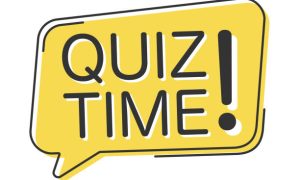
Quiz Commando

Basic Computer Knowledge
- What does CPU stand for?
- a) Central Processing Unit
- b) Computer Programming Unit
- c) Control Processing Unit
- d) Central Programming Utility
- Which part of a computer is considered the “brain”?
- a) RAM
- b) CPU
- c) Hard Drive
- d) Motherboard
- What is the primary function of RAM in a computer?
- a) Store data permanently
- b) Execute programs
- c) Store data temporarily for active use
- d) Connect devices to the internet
- Which key combination is commonly used to copy text?
- a) Ctrl + X
- b) Ctrl + C
- c) Ctrl + V
- d) Ctrl + Z
- What does URL stand for?
- a) Unified Resource Link
- b) Universal Resource Locator
- c) Uniform Reference Locator
- d) Universal Referencing Link
Intermediate Computer Knowledge
- What is the purpose of an operating system?
- a) To process network requests
- b) To manage hardware and software resources
- c) To store data permanently
- d) To secure the computer
- Which type of software controls the way a computer works and provides a platform for applications?
- a) System Software
- b) Utility Software
- c) Application Software
- d) Productivity Software
- What is an IP address used for?
- a) Encrypting network data
- b) Uniquely identifying devices on a network
- c) Accelerating web browsing speed
- d) Connecting to wireless networks
- Which of the following is a programming language?
- a) HTML
- b) Python
- c) CSS
- d) SQL
- What does HTTP stand for?
- a) HyperText Transmission Protocol
- b) HyperText Transfer Protocol
- c) Hyperlink Transfer Protocol
- d) Hyperlink Text Protocol
Advanced Computer Knowledge
- What is virtualization in computing?
- a) Creating physical copies of software
- b) Simulating hardware or resources
- c) Protecting systems from malware
- d) Compressing large files
- What is the function of DNS in networking?
- a) Converting IP addresses into domain names
- b) Translating domain names into IP addresses
- c) Encrypting data packets
- d) Managing internet speed
- What is the difference between SSD and HDD?
- a) SSDs are faster and more durable than HDDs
- b) HDDs are faster and more durable than SSDs
- c) SSDs are cheaper than HDDs
- d) HDDs use flash memory, while SSDs use spinning disks
- What is the role of a compiler in programming?
- a) Debugging code
- b) Translating high-level code into machine code
- c) Managing software dependencies
- d) Running code directly on the processor
- What is the purpose of encryption?
- a) Improving data storage capacity
- b) Securing data by converting it into a code
- c) Speeding up data transfer
- d) Compressing large files
- What does “Open Source” software mean?
- a) Software available for free
- b) Software with freely available source code
- c) Software limited to one user
- d) Software that requires payment
- Which protocol is commonly used for email transmission?
- a) FTP
- b) SMTP
- c) HTTP
- d) SSH
- What is the binary equivalent of the decimal number 10?
- a) 1010
- b) 1100
- c) 1001
- d) 1110
- Which technology is used to connect wireless devices to a network?
- a) Bluetooth
- b) Wi-Fi
- c) Ethernet
- d) Fiber Optics
- What is the full form of SQL?
- a) Sequential Query Language
- b) Structured Query Language
- c) Standardized Query Language
- d) Server Query Language
To Top





